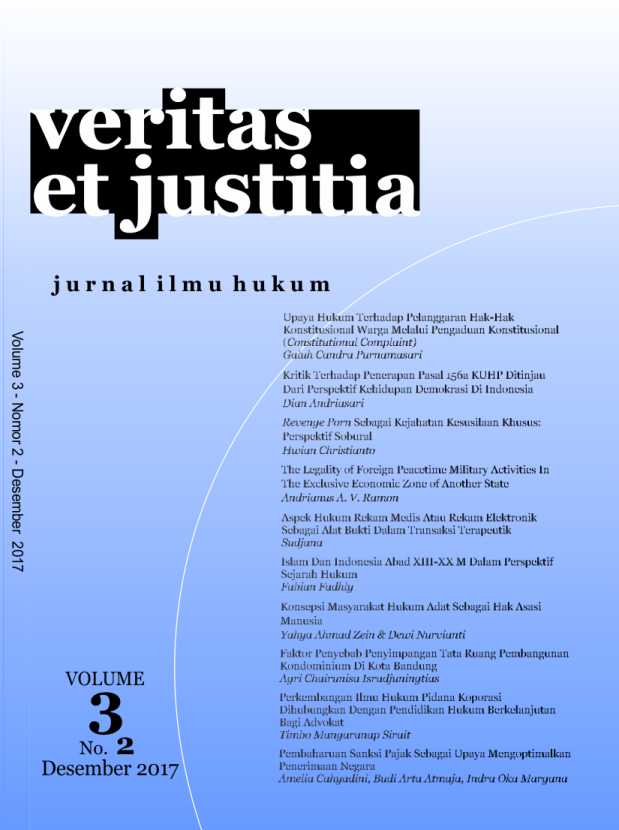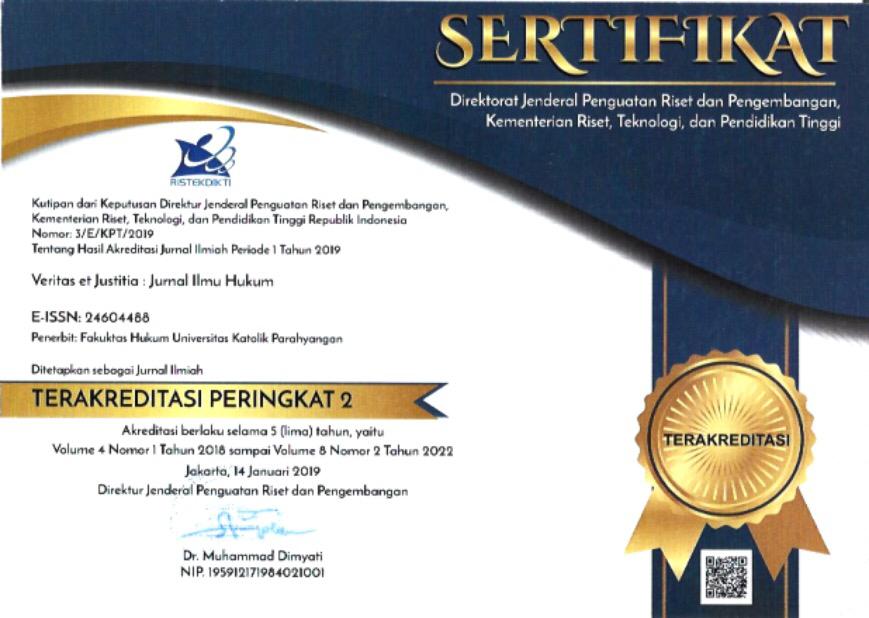Revenge porn sebagai Kejahatan Kesusilaan Khusus: perspektif Sobural
DOI:
https://doi.org/10.25123/vej.v3i2.2682Abstrak
Revenge porn is a new growing modus operandi of crime in society. Law enforcement still considers porn revenge as a pornographic crime in general as it is an activity of disseminating information that violates decency. Approach used by law enforcement in assessing revenge porn is still limited to formal juridical approach without considering the characteristics of porn revenge that substantive justice is not fulfilled. As part of a full understanding of porn revenge, a Criminological understanding of the Sobural approach is made. Two issues to be studied are (1) what is the significance of using the Sobural approach? And (2) Is revenge porn a decency crime based on the Sobural approach? Empirical juridical research method is used in this study by basing on a primer in the form of legislation supported by criminal law theory related to revenge porn. Exposure from primary data is associated with secondary data in the form of Judge Judgment to see understanding of defeating of revenge porn by a judge. The results of the study show that criminological understanding of porn revenge provides a very significant different approach in criminal law. Revenge porn is judged by the context of the community in which the perpetrators and acts of revenge porn are performed. Sobural (Social, Cultural and Structural) approach affirms contextual assessment of porn revenge based on social values, cultural values and structural factors of society. The approach of these three elements has a close correlation with the moral norms as the measure of defamation of crime of pornography as a decency crime. The integration of the Sobural approach to the understanding of moral norms in assessing porn revenge will provide an opportunity for the enforcement of living laws in society.Referensi
Buku-buku
Freda Adler, Gerhard O.W. Mueller & William S. Laufer, Criminology and the Criminal Justice System (Mcgraw Hill, New York, 2007).
Bernard L. Tanya, Theodora Yosep Parera, & Samuel F. Lena, Pancasila sebagai Bingkai Hukum Indonesia (Genta Publishing, Yogyakarta, 2015).
E.Y. Kanter dan S.R. Sianturi, Asas-asas Hukum Pidana di Indonesia dan Penerapannya (Storia Grafika, Jakarta, 2012).
J.E. Sahetapy, Pisau Analisa Kriminologi: Pidato Pengukuhan Guru Besar Fakultas Hukum Universitas Airlangga (Fakultas Hukum Universitas Surabaya, Surabaya, 30 Juli 1983).
_______________, Teori Kriminologi: Suatu Pengantar (Citra Aditya Bakti, Bandung, 1992).
_______________, Elfina Sahetapy, ed., Pisau Analisis Kriminologi (Citra Aditya Bakti, Bandung, 2005).
Yee Fen Lim, Cyberspace Law: Commentaries and Materials (Oxford University Press, Victoria, 2007).
Moeljatno, KUHP: Kitab Undang-Undang Hukum Pidana (Bumi Aksara, Jakarta, 2011).
Notonagoro, Pancasila secara Ilmiah Populer (Bina Aksara, Jakarta, 1983).
R. Soesilo, Kitab Undang-Undang Hukum Pidana (KUHP) serta Komentar-Komentarnya Lengkap Pasal Demi Pasal (Politeia, Bogor, 1974).
Artikel
Christina Widowati, Hukum sebagai Norma Sosial memiliki Sifat Mewajbkan, 14 Jurnal Hukum ADIL. (2013).
Gabriella Febrianty, Philosophy, Pancasila and Modern Technology 292 Jurnal Yuridika, (2014).
Indriyanto Seno Adji, Prospek Hukum Pidana Indonesia pada Masyarakat yang Mengalami Perubahan, 63 Jurnal Keadilan. (2003).
Ismansyah & Ermawati B, Permasalahan Delik Zina Yang Terdapat dalam Kitab Undang-Undang Hukum Pidana (KUHP) IX 1 Jurnal DELICTI 27 (2012).
Kamarudin Hasan, Pancasila dan Arsitektur Negara Hukum Indonesia, 4 September-Februari 2013 Jurnal Digest Epistema (2013).
Komaruddin Hidayat, Neotribalisme, 22 September Koran Kompas. (2016).
M. Syamsudin, Keadilan Prosedural dan Substantid dalam Putusan Sengketa Tanah Magersari: Kajian Putusan Nomor 74/PDT.G/2009/PN.YK 17 Jurnal Yudisial (2014).
Web Documents
Toetik Rahayuningsih, Kejahatan Kesusilaan dan Upaya Penanggulangannya: Studi pada Tingkat Penyidikan, Penuntutan dan Pemeriksaan di Pengadilan Negeri Surabaya, Fakultas Hukum Universitas Airlangga, 22 April 2014, http://adln.lib.unair.ac.id/go.php?id=gdlhub-gdl-res-2014-rahayuning-34480&q=kesusilaan, (terakhir diakses 12 Mei, 2017).
Sumber Hukum Primer
Putusan Pengadilan, Putusan Pengadilan Negeri Malang No. 645/Pid.Sus/2015/PN.Mlg, tanggal 17 Februari 2016
Putusan Pengadilan, Putusan Pengadilan Negeri Banyuwangi No. 726/Pid.Sus/2015/PN Bwi tanggal 3 Maret 2016
Putusan Pengadilan, Putusan Pengadilan Negeri Mojokerto No. 425/Pid.Sus/2015/PN Mjk tanggal 24 November 2015
Putusan Pengadilan, Putusan Pengadilan Negeri Probolinggo No. 78/Pid.B/2015/PN-Prob, https://putusan.mahkamahagung.go.id/main/pencarian/?q=78%2FPid.B%2F2015%2FPN-Prob (terakhir diakses 12 Mei 2017)
Putusan Pengadilan, Putusan Pengadilan Negeri Ciamis No. 267/Pid.Sus/2015/PN.Cms, https://putusan.mahkamahagung.go.id/main/pencarian/?q=267%2FPid.Sus%2F2015%2FPN.Cms+ (terakhir diakses 12 Mei 2017)
Putusan Pengadilan, Putusan Pengadilan Negeri Rokan Hilir No. 584/Pid.Sus/2014/PN.RHL, https://putusan.mahkamahagung.go.id/main/pencarian/?q=584%2FPid.Sus%2F2014%2FPN.RHL+ (diakses terakhir 12 Mei 2017)
##submission.downloads##
Diterbitkan
Terbitan
Bagian
Lisensi
Authors who publish with this journal agree to the following terms:
Authors retain copyright and grant the journal right of first publication with the work simultaneously licensed under a Creative Commons Attribution License that allows others to share the work with an acknowledgement of the work's authorship and initial publication in this journal.
Authors are able to enter into separate, additional contractual arrangements for the non-exclusive distribution of the journal's published version of the work (e.g., post it to an institutional repository or publish it in a book), with an acknowledgement of its initial publication in this journal.
Authors are permitted and encouraged to post their work online (e.g., in institutional repositories or on their website) prior to and during the submission process, as it can lead to productive exchanges, as well as earlier and greater citation of published work.
The Journal allow the author(s) to hold the copyright and to retian publishing rights without restrictions.










